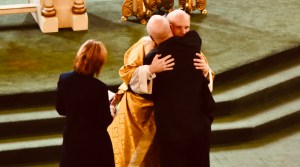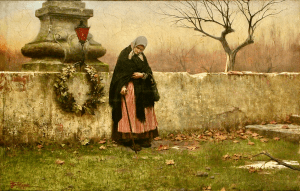We support our Publishers and Content Creators. You can view this story on their website by CLICKING HERE.
 Ever since I began priestly formation, the month of November has carried with it a certain solemnity and gravity. In this way, I have found the month to be both celebratory and weighty in nature. Celebratory because I am keenly reminded of life’s goal—heaven. Yet, weighty because of death’s reality and the shortness of my own earthly life. For all of us, the solemnity and gravity of this month take root in the Solemnity of All Saints and the Commemoration of All the Faithful Departed.
Ever since I began priestly formation, the month of November has carried with it a certain solemnity and gravity. In this way, I have found the month to be both celebratory and weighty in nature. Celebratory because I am keenly reminded of life’s goal—heaven. Yet, weighty because of death’s reality and the shortness of my own earthly life. For all of us, the solemnity and gravity of this month take root in the Solemnity of All Saints and the Commemoration of All the Faithful Departed.
This year, I have felt the solemnity and gravity more acutely. My father passed away back in August and the nature of the month has moved me to reflect on something written by King Solomon. For Love is strong as Death…. Deep waters cannot quench love, nor rivers sweep it away (Song 8:6-7). If the king is right, death is defeated by love. Nothing can sweep away its effects, not even the high tides of the sea. The Carmelite mystic, John of the Cross, must have been right when he said, “At the evening of life, we will be judged on love alone.”
As I celebrate the saints and the eternity of heaven, I realize that day isn’t too far off for me. Yet, even more, I increasingly realize that one is only admitted to this eternal home once he is perfected in love. Thus, I wonder, how do I become more perfect in love? For this, I look to the example of my father. In three ways, he taught me that love is ordered. God, self, others.
My dad would often say, “Unless God is first in your life, nothing else will follow.” He modeled this for me on one particular occasion when I first shared with him my desire to become a priest. “I feel like Abraham with Isaac,” he said. “You really don’t belong to me, you belong to God.” Thus, he freely let me make my application for seminary out of his own sincere love for God.
It was my dad who taught me to love myself by saying on numerous occasions, “Be yourself, son.” He seemed to have an intuitive sense that God created each of us for a purpose, and as his son, I wouldn’t be happy unless I began to live this way. For him, the exhortation to be myself meant, “Find what it is you were made for and you will be happy.” In this way, he taught me to truly love myself by rooting my happiness in nothing less than God.
Finally, I learned how to love others through the example of his constant desire to serve. It usually began with a smirk and the words, “What’s the issue?” Whether it was a late-night phone call from one of his deputies at the Sheriff’s Department, a concerned parent at the local Catholic school, or his son who had waited too long to do his math homework, he had a habit of giving his all to everyone at every moment.
It’s the ones who go before us that show us the way. As I remember my father in prayer this month, I trust that by his participation in this plan of ordered love—God, self, others—and with God’s mighty grace, he happily passed from this world to the next. I pray that this plan of ordered love be taught by all fathers to their children. By ordering our love, comes the certainty of achieving life’s goal—heaven. Thank you, Dad, for teaching me how to love. May you rest in peace in the Father’s love.
✠
Republished with gracious permission from Dominicana (November 2024).
The Imaginative Conservative applies the principle of appreciation to the discussion of culture and politics—we approach dialogue with magnanimity rather than with mere civility. Will you help us remain a refreshing oasis in the increasingly contentious arena of modern discourse? Please consider donating now.
About the image: The above photo was taken at my first Mass of Thanksgiving as a newly ordained priest. At this Mass, there is a tradition for the priest to give his father a gift: the stole with which he heard his first confession, where a priest is called to show the loving mercy of Christ. Once the priest’s father has died, the stole is wrapped around his hands to be buried with him. With this, a father presents himself to God as one who gave his son as an offering for the Kingdom.
Share This Story, Choose Your Platform!
Go to Top

 Conservative
Conservative  Search
Search Trending
Trending Current News
Current News 






